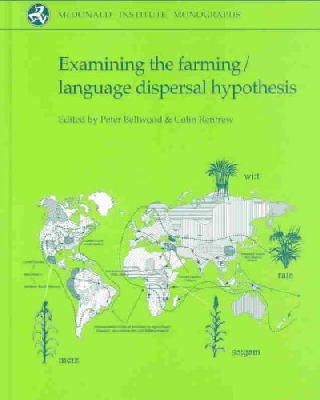
Stock image for illustration purposes only - book cover, edition or condition may vary.
Examining the Farming/Language Dispersal Hypothesis (McDonald Institute Monographs,)
Peter Bellwood
€ 58.65
FREE Delivery in Ireland
Description for Examining the Farming/Language Dispersal Hypothesis (McDonald Institute Monographs,)
Hardcover. A radical new theory of how languages were dispersed around the globe is debated by experts in historical linguistics, prehistoric archaeology, molecular genetics and human ecology. Editor(s): Bellwood, Peter; Renfrew, Lord Colin. Series: McDonald Institute Monographs. Num Pages: 520 pages, 88 figs, 21 tables. BIC Classification: CFF; HDDA; RNT. Category: (P) Professional & Vocational; (U) Tertiary Education (US: College). Dimension: 289 x 223 x 32. Weight in Grams: 1798.
Linguistic diversity is one of the most puzzling and challenging features of humankind. Why are there some six thousand different languages spoken in the world today? Why are some, like Chinese or English, spoken by millions over vast territories, while others are restricted to just a few thousand speakers in a limited area? The farming/language dispersal hypothesis makes the radical and controversial proposal that the present-day distributions of many of the world's languages and language families can be traced back to the early developments and dispersals of farming from the several nuclear areas where animal and plant domestication emerged. For instance, the Indo-European and Austronesian language families may owe their current vast distributions to the spread of food plants and of farmers (speaking the relevant proto-language) following the Neolithic revolutions which took place in the Near East and in Eastern Asia respectively, thousands of years ago. In this challenging book, international experts in historical linguistics, prehistoric archaeology, molecular genetics and human ecology bring their specialisms to bear upon this intractable problem, using a range of interdisciplinary approaches. There are signs that a new synthesis between these fields may now be emerging. This path-breaking volume opens new perspectives and indicates some of the directions which future research is likely to follow.
Product Details
Publisher
McDonald Institute for Archaeological Research
Format
Hardback
Publication date
2003
Series
McDonald Institute Monographs
Condition
New
Weight
1797 g
Number of Pages
520
Place of Publication
Cambridge, United Kingdom
ISBN
9781902937205
SKU
V9781902937205
Shipping Time
Usually ships in 4 to 8 working days
Ref
99-1
About Peter Bellwood
Colin Renfrew is is Disney Professor of Archaeology at Cambridge University and Director of the McDonald Institute. His many publications include Archaeology: Theories, Methods, Practice (Thames and Hudson 3rd ed 2000) and Archaeogenetics: DNA and the Population Prehistory of Europe (McDonald Institute 2000).Peter Bellwood is Professor of Archaeology at the Australian National University, Canberra. He is an expert on the prehistory of Southeast Asia and the Pacific, the origins of agriculture, and related linguistic and biological developments.
Reviews for Examining the Farming/Language Dispersal Hypothesis (McDonald Institute Monographs,)
